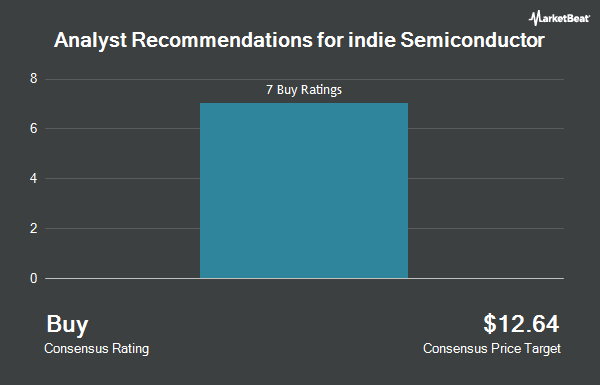indie Semiconductor, Inc. (NASDAQ:INDI - Get Free Report) has been assigned a consensus rating of "Moderate Buy" from the seven analysts that are currently covering the company, Marketbeat Ratings reports. One research analyst has rated the stock with a hold rating and six have issued a buy rating on the company. The average twelve-month price objective among brokerages that have covered the stock in the last year is $5.75.
A number of analysts have recently weighed in on INDI shares. Benchmark reiterated a "buy" rating and issued a $6.00 price objective on shares of indie Semiconductor in a research note on Wednesday, June 11th. B. Riley reaffirmed a "buy" rating on shares of indie Semiconductor in a report on Thursday, April 24th. Craig Hallum reduced their price objective on indie Semiconductor from $8.00 to $6.00 and set a "buy" rating for the company in a research note on Tuesday, May 13th. Finally, KeyCorp decreased their price objective on indie Semiconductor from $7.00 to $6.00 and set an "overweight" rating for the company in a report on Tuesday, May 13th.
Read Our Latest Research Report on indie Semiconductor
Insider Buying and Selling at indie Semiconductor
In other indie Semiconductor news, COO Michael Wittmann sold 13,725 shares of the stock in a transaction on Monday, June 2nd. The shares were sold at an average price of $2.59, for a total transaction of $35,547.75. Following the transaction, the chief operating officer now directly owns 101,662 shares of the company's stock, valued at $263,304.58. This trade represents a 11.89% decrease in their ownership of the stock. The transaction was disclosed in a document filed with the SEC, which is accessible through this hyperlink. Also, Director Sonalee Elizabeth Parekh sold 11,841 shares of the business's stock in a transaction dated Monday, June 16th. The stock was sold at an average price of $3.42, for a total transaction of $40,496.22. Following the sale, the director now directly owns 119,857 shares of the company's stock, valued at $409,910.94. This represents a 8.99% decrease in their position. The disclosure for this sale can be found here. Over the last quarter, insiders sold 39,291 shares of company stock valued at $111,592. Corporate insiders own 5.60% of the company's stock.
Institutional Inflows and Outflows
A number of hedge funds and other institutional investors have recently bought and sold shares of the stock. Fred Alger Management LLC purchased a new stake in indie Semiconductor during the 1st quarter worth approximately $2,527,000. Nexpoint Asset Management L.P. boosted its holdings in shares of indie Semiconductor by 43.7% during the 1st quarter. Nexpoint Asset Management L.P. now owns 165,959 shares of the company's stock worth $338,000 after purchasing an additional 50,459 shares during the last quarter. Millennium Management LLC grew its position in shares of indie Semiconductor by 456.6% in the first quarter. Millennium Management LLC now owns 3,702,671 shares of the company's stock valued at $7,535,000 after purchasing an additional 3,037,435 shares in the last quarter. MIRAE ASSET GLOBAL ETFS HOLDINGS Ltd. grew its position in shares of indie Semiconductor by 42.4% in the first quarter. MIRAE ASSET GLOBAL ETFS HOLDINGS Ltd. now owns 1,002,253 shares of the company's stock valued at $2,040,000 after purchasing an additional 298,339 shares in the last quarter. Finally, Royal Bank of Canada increased its holdings in shares of indie Semiconductor by 309.7% in the first quarter. Royal Bank of Canada now owns 551,007 shares of the company's stock valued at $1,122,000 after purchasing an additional 416,519 shares during the last quarter. 67.73% of the stock is owned by hedge funds and other institutional investors.
indie Semiconductor Stock Performance
INDI traded up $0.05 on Monday, reaching $3.21. 2,880,412 shares of the stock were exchanged, compared to its average volume of 3,764,610. The company has a debt-to-equity ratio of 0.85, a current ratio of 5.30 and a quick ratio of 4.64. The company's 50-day moving average price is $2.46 and its 200 day moving average price is $3.16. The firm has a market capitalization of $682.16 million, a PE ratio of -4.28 and a beta of 2.12. indie Semiconductor has a fifty-two week low of $1.53 and a fifty-two week high of $7.45.
indie Semiconductor (NASDAQ:INDI - Get Free Report) last released its earnings results on Monday, May 12th. The company reported ($0.08) EPS for the quarter, hitting analysts' consensus estimates of ($0.08). indie Semiconductor had a negative return on equity of 27.25% and a negative net margin of 62.64%. The firm had revenue of $54.08 million during the quarter, compared to the consensus estimate of $54.94 million. During the same quarter in the previous year, the company posted ($0.10) earnings per share. The company's revenue was up 3.2% compared to the same quarter last year. As a group, sell-side analysts forecast that indie Semiconductor will post -0.54 EPS for the current fiscal year.
About indie Semiconductor
(
Get Free Reportindie Semiconductor, Inc provides automotive semiconductors and software solutions for advanced driver assistance systems, autonomous vehicle, in-cabin, connected car, and electrification applications in the United States, South America, rest of North America, Greater China, South Korea, rest of the Asia Pacific, and Europe.
Read More

Before you consider indie Semiconductor, you'll want to hear this.
MarketBeat keeps track of Wall Street's top-rated and best performing research analysts and the stocks they recommend to their clients on a daily basis. MarketBeat has identified the five stocks that top analysts are quietly whispering to their clients to buy now before the broader market catches on... and indie Semiconductor wasn't on the list.
While indie Semiconductor currently has a Moderate Buy rating among analysts, top-rated analysts believe these five stocks are better buys.
View The Five Stocks Here
Wondering what the next stocks will be that hit it big, with solid fundamentals? Enter your email address to see which stocks MarketBeat analysts could become the next blockbuster growth stocks.
Get This Free Report
Like this article? Share it with a colleague.
Link copied to clipboard.